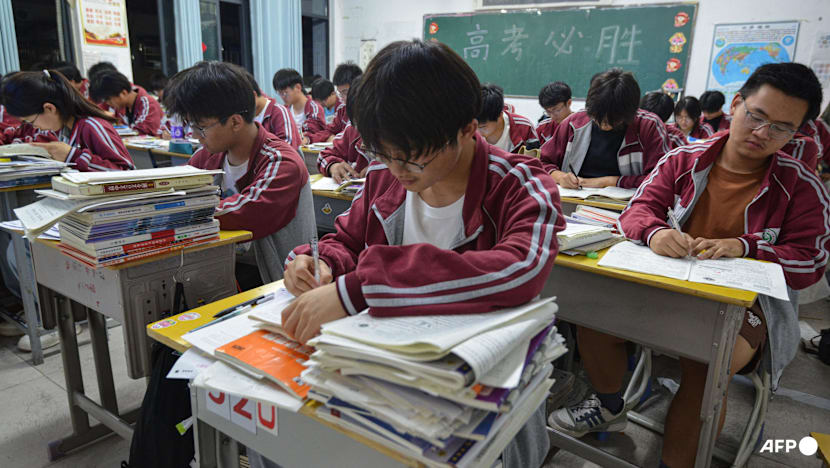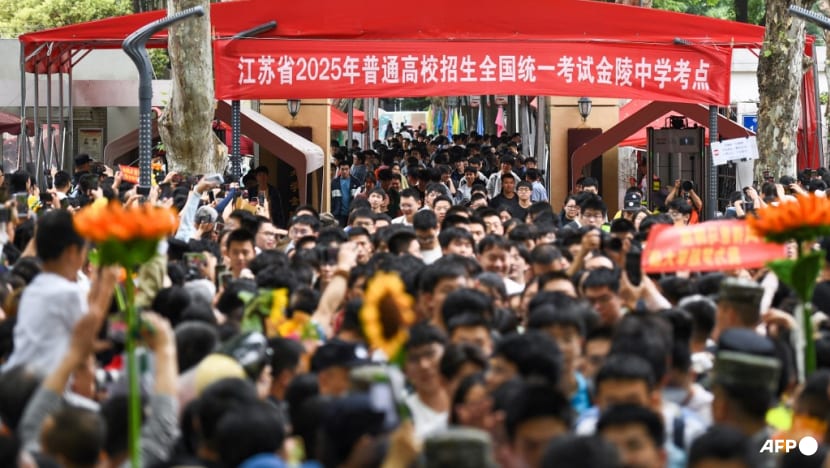Less admin, more teaching: China moves to ease teachers’ workload
The aim is to “minimise unnecessary interference, so that teachers can concentrate on teaching”, says an education ministry official.

High school students prepare for China's national college entrance examination, known as gaokao, in Fuyang in Anhui province on May 27, 2025. (Photo: AFP/STR)

This audio is generated by an AI tool.
BEIJING: China’s education ministry has unveiled new measures to ease the non-teaching workload of primary and secondary school teachers, so they can devote their attention to the classroom.
Made public on Monday (Nov 10), the eight-point directive calls on local governments to tighten scrutiny over how tasks are assigned to teachers while also reducing paperwork and inspections.
Under the new rules, each school will undergo no more than one major inspection a year, while checks disguised as “research” or “monitoring” are banned, said the education ministry.
A new “whitelist” system will regulate non-academic activities on campus. Provincial authorities can approve up to 10 activities per semester, while individual schools can host a maximum of six.
“It is strictly forbidden to require teachers … to participate in activities unrelated to education and teaching,” the notice stated, citing examples such as street patrols or festival performances.
The evaluation of teachers must not be linked to their participation in such activities, the ministry further noted.
Full-time teachers should also not be assigned any work duties during statutory and school holidays, weekends and other periods when no students are on campus.
The ministry said teachers should not be compelled to take part in training unrelated to classroom instruction, except where legally required. It also instructed schools to avoid holding such sessions during peak teaching periods.
To better safeguard teachers’ “rights and interests”, after-school services should be held on school days and end according to “local off-work hours”, the ministry said.
Schools may also adopt flexible work schedules for teachers involved in after-school services, ensuring that extended hours do not add to their overall workload.
Other rules include restricting the secondment of teachers to government departments, regulating how many teachers serve as examination invigilators, cutting back on red tape and putting in measures to better monitor and verify educators’ workload.
The education ministry’s notice did not detail the timeline of the roll-out, how teachers could go about reporting potential violations and the penalties for non-compliance.
China’s education system is fiercely competitive, centred on the national university entrance exam known as the gaokao, which is widely seen as a gateway to top universities and stable careers. The intense pressure to deliver results inevitably trickles down to teachers.
In April last year, China had signalled its intent to reduce teachers’ non-teaching workload, with plans to implement a reporting system to regulate the number of non-educational activities schools oversee.

The latest measures were formulated after reviewing past practices across regions and analysing current challenges, state news outlet Global Times quoted an education ministry official as saying on Monday.
The aim is to “effectively minimise unnecessary interference, so that teachers can concentrate on teaching”, said the official.
"Our goal is to ensure that (teachers’) time and energy are truly devoted to the core mission of fostering moral integrity and nurturing talent.”
The notice reflects the extent of the problem and the “urgent need” to address it, Chu Zhaohui, a research fellow at the National Institute of Education Sciences, was quoted as saying by Global Times.
“Meanwhile, we must recognise that it cannot be resolved overnight - it involves long-standing issues, including deep-rooted systemic challenges in management,” Chu said.
















